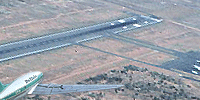 |
 |
|
||||
|
By
Wikipedia, The Outer Space Treaty, formally known as the Treaty on Principles Governing the Activities of States in the Exploration and Use of Outer Space, including the Moon and Other Celestial Bodies, is a treaty that forms the basis of international space law. The treaty was opened for signature in the United States, the United Kingdom, and the Soviet Union on January 27, 1967, and entered into force on October 10, 1967. As of January 2008, 99 countries are states-parties to the treaty, while another 26 have signed the treaty but have not yet completed ratification. Key points of the TreatyThe Outer Space Treaty represents the basic legal framework of international space law. Among its principles, it bars States Parties to the Treaty from placing nuclear weapons or any other weapons of mass destruction in orbit of Earth, installing them on the Moon or any other celestial body, or to otherwise station them in outer space. It exclusively limits the use of the Moon and other celestial bodies to peaceful purposes and expressly prohibits their use for testing weapons of any kind, conducting military maneuvers, or establishing military bases, installations, and fortifications (Art.IV). However, the Treaty does not prohibit the placement of conventional weapons in orbit. The treaty explicitly forbids any government from claiming a celestial resource such as the Moon or a planet, since they are province of mankind. Art. II of the Treaty states, in fact, that "outer space, including the Moon and other celestial bodies, is not subject to national appropriation by claim of sovereignty, by means of use or occupation, or by any other means". The pendant for giving up sovereignty in outer space is the jurisdiction and control that the State that launches a space object retains. According to Manfred Lachs, jurisdiction and control is giving the means to the State to conduct a mission of space exploration.
Responsibility for activities in spaceArticle VI of the Outer Space Treaty deals with international responsibility, stating that "the activities of non-governmental entities in outer space, including the moon and other celestial bodies, shall require authorization and continuing supervision by the appropriate State Party to the Treaty" and that States Parties shall bear international responsibility for national space activities whether carried out by governmental or non-governmental entities. Following discussions arising from Project West Ford, a consultation clause was inserted in Article IX of the Outer Space Treaty: "A State Party to the Treaty which has reason to believe that an activity or experiment planned by another State Party in outer space, including the Moon and other celestial bodies, would cause potentially harmful interference with activities in the peaceful exploration and use of outer space, including the Moon and other celestial bodies, may request consultation concerning the activity or experiment." Effect of the Outer Space TreatyExperts of international space law state that the Moon falls under the legal concept of res communis, which means that it belongs to a group of people, and may be used by every member of the group, but cannot be appropriated by anyone (the concept is also applied to International Waters). The effect of the Outer Space Treaty is to restrict control of private property rights, in the way that the law of the sea prevents anyone owning the high seas. This is often disputed by those who claim the ability to sell property rights on the Moon and other bodies, but the dispute has never been tested in a court of law. Follow-ups
See also
External links
Text from Wikipedia is available under the Creative Commons Attribution/Share-Alike License; additional terms may apply.
Published in July 2009. Click here to read more articles related to aviation and space!
|

 |
|
Copyright 2004-2025 © by Airports-Worldwide.com, Vyshenskoho st. 36, Lviv 79010, Ukraine Legal Disclaimer |